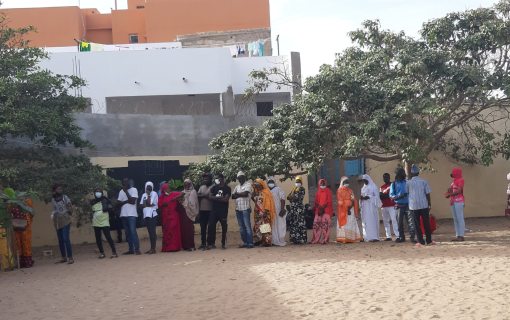Video Playlist: IFES' 2014 U.S. Election Program
The International Foundation for Electoral Systems (IFES) hosted 150 participants from 55 countries during the 12th U.S. Election Program from November 2-5, 2014. The program featured lively presentations and discussions about the nuances and idiosyncrasies of the U.S. electoral system.
We invite you to watch the videos of the main plenary sessions, examining the future of political finance regulation, the role of the federal government in enforcing voting rights, legislation that expands the political rights of persons with disabilities in the U.S., challenges and opportunities for women’s participation in U.S. politics, and a wide range of other issues.
America Votes: An Introduction to the U.S. Election System(s)
The Constitution of the United States guarantees American citizens the right to vote for their government representatives every two years, on the first Tuesday (after the first Monday) in November. Yet, it is the laws of the states and territories that govern the administration of these elections and together constitute the electoral system. The decentralized nature of elections in the United States is a product of federalism, history and political traditions.
Moderated by Michael Svetlik, IFES Vice President of Programs
Speakers:
Thad Hall, Director of the Master of Public Policy Program, University of Utah
Doug Chapin, Director, Program for Excellence in Election Administration, University of Minnesota
From Selma to Montgomery and Beyond: The 1965 Voting Rights Act and the Future Role of the Federal Government in Elections
The passage of the 1965 Voting Rights Act was a watershed in American history that sought to prohibit discrimination in the election process. A central feature of the Act was the requirement that some states with a history of discriminatory practices seek federal approval prior to enacting any changes to their election laws. A 2013 decision by the Supreme Court called into question, however, the role of the federal government in enforcing voting rights. In the Shelby County v. Holder decision, the Supreme Court struck down Section 4 of the Act, which contained the formulas used to determine the list of districts that must receive this pre-clearance approval. Over the past year, many states – including those listed in Section 4 – have legislated changes to their election processes. These changes range from administrative changes to improve access to the vote – such as online voting tools – to those that may serve to limit access at the polls, including shortened hours and more stringent voter identification requirements.
Moderated by Chad Vickery, IFES Director of the Center for Applied Research and Learning
Speakers:
Daniel P. Tokaji, Charles W. Ebersold and Florence Whitcomb Ebersold Professor of Constitutional Law, The Ohio State University’s Moritz College of Law
Brendan J. Morrissey, Counsel, Wiley Rein LLP
Money Talks: Free Speech, Political Action Committees and the Future of Campaign Finance Regulation
Recent rulings by the United States Supreme Court have removed long-standing limits on election contributions and spending by individuals and organizations. In 2010, the Citizens United ruling held that the government may not place limits on independent spending for political purposes by corporations and labor unions in candidate elections. Earlier this year, the Court removed aggregate limits on campaign contributions finding that such restrictions violated constitutional free speech guarantees. These decisions have dramatically changed the landscape of campaign finance in the United States.
Moderated by Magnus Ohman, IFES Senior Political Finance Adviser
Speakers:
Ellen Weintraub, Commissioner, Federal Election Commission
Trevor Potter, President, Campaign Legal Center
More Power to More People: How the ADA and the CRPD are Expanding Political Rights
Twenty-four years ago, the United States became the first country in the world to adopt national civil rights legislation banning discrimination against people with disabilities. Since that time, the Americans with Disabilities Act (ADA) and the Help America Vote Act (HAVA) have provided the legal context for accessible and inclusive elections. The UN Convention on the Rights of Persons with Disabilities (CRPD), which came into force in 2008, incorporated many standards identified in U.S. legislation.
Moderated by Virginia Atkinson, IFES Access and Inclusion Specialist
Speakers:
Judith Heumann, Special Advisor for International Disability Rights, U.S. Department of State
Charlotte McClain-Nhlapo, Coordinator for Disability and Inclusive Development, USAID
Lewis Bossing, Senior Staff Attorney, Bazelon Center for Mental Health Law
Erasing the Gender Gap: Successful Strategies to Boost Women’s Participation in U.S. Politics
In the United States and countries around the world, women and men have the right to vote and run for office. There has been good gender news in recent elections. In the 2012 U. S. presidential elections, women outnumbered men as voters 53 percent to 47 percent respectively. Women made “big gains” in office, with a record 20 female Senators and 97 Congresswomen now in Congress. Despite these upward trends, numbers fall short of gender parity, especially for women as elected officials. Why is this? Do women have the time and resources to run? Do they have the right connections in a traditionally male dominated arena? Do they have the information to become engaged? Why does gender parity matter?
Moderated by Jessica Huber, IFES Senior Gender Adviser
Speakers:
Semhar Araia, Executive Director, Diaspora African Women's Network (DAWN)
Susannah Wellford, President and Founder, Running Start











